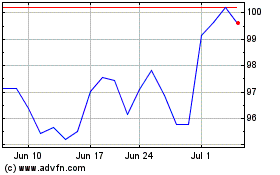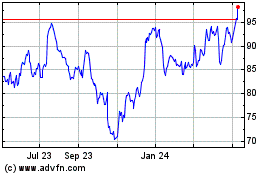By Sara Castellanos
Companies are looking to supercharge corporate decision making
through artificial intelligence, but first they need help preparing
the troves of customer and business data they have acquired over
the years.
Morgan Stanley, for example, has set up a Data Center of
Excellence to help address the ongoing deluge and complexity of
enterprise data and to help develop artificial intelligence
applications that rely on high-quality data.
About 30 experts specializing in data architecture,
infrastructure and governance are acting as data advisers to
different business and technology divisions within the bank, partly
to ensure AI and other applications are being built with the right
data.
"The reason we have the Center of Excellence is we want to
continue to build on AI, and we understand this is one of the
foundational areas that is needed," said Katherine Wetmur, head of
quality assurance and production management, who is transitioning
into the role of international chief information officer. Ms.
Wetmur works with the team to develop services across business
units and oversees separate data-related projects.
Morgan Stanley recently posted a profit of $2.4 billion, or
$1.39 a share, on revenue of $10.3 billion. Both are lower than the
same period a year earlier, when the firm earned $2.7 billion, or
$1.45 a share, on record quarterly revenue of $11.1 billion.
Created last year with staffers spread across New York and
London, the Data Center of Excellence works with the bank's various
business and infrastructure divisions to establish best practices
and controls around data quality and data security.
The data group is working closely with Morgan Stanley's AI team
to make sure AI algorithms in areas such as commercial real-estate
loan analysis, fraud detection and virtual wealth management
advisory services are using the appropriate data. "We want to make
sure we have high-quality data, because your insights are only as
good as the data that underpins it," said Gez Hester, head of the
Data Center of Excellence.
High-quality data is data that's accurate, up-to-date and
complete, Mr. Hester said. To achieve that, the data team must
catalogue all the data that's available in, for example, the
commercial real-estate loan business and understand the data's
provenance, where it is being sourced from, and how it is going to
be used. Data provenance is key for ensuring that the insights are
useful and trustworthy, he said.
In the dawn of AI-enabled decision making, the notion of data as
a strategic asset is rising at companies such as Morgan Stanley. At
the same time, managing data has grown increasingly complex, the
result of multiple data centers and data storage repositories
across disparate systems, multiple copies of the same data and new
data privacy laws.
The new data emphasis is changing the CIO focus at some
companies from big business applications to the data layer, said
Anil Chakravarthy, chief executive of data management firm
Informatica.
Poor quality, inaccurate and unreliable customer and business
data is preventing companies from leveraging AI, according to
recent studies. About 76% of firms are aiming to extract value from
data they already have, but only 15% said they currently have the
right kind of data needed to achieve that goal, according to
PricewaterhouseCoopers. The firm in January polled about 300
executives at U.S. companies in a range of industries with revenue
of $500 million or more.
More than one petabyte of new data, equivalent to about 1
million gigabytes, is entering Morgan Stanley's systems every
month, according to the bank.
Morgan Stanley's new data group has worked with internal AI
teams on processing and summarizing unstructured data, a broad
category that includes web pages and PDF files and other data not
already housed in rows and columns, related to commercial
real-estate loans. The data group helped develop an application
that allows traders to analyze the risk of a loan without having to
do deeper analysis manually.
Another AI system developed with help from the group analyzes
transactions that can indicate fraudulent behavior. This represents
a major shift in the way AI can help humans process massive amounts
of data that otherwise couldn't be analyzed, Ms. Wetmur said. "In
the past, you couldn't consume the data in the speed that was
needed to get these insights," she said.
Separately, Ms. Wetmur has been working on data projects to
speed up the time it takes to test various applications before
deployment. To do that, her team sought technology from Redwood
City, Calif.-based Delphix Corp., a vendor that allows companies to
virtualize, secure and manage data.
Delphix's technology allows data to exist in one virtual copy
for each group that needs it so that changes can be made on a
single copy in real time. This significantly increases the speed
and delivery of application code, Ms. Wetmur said. Application
testers can now have access to accurate, up-to-date data in minutes
instead of the 10 to 12 hours it would take through traditional
methods of copying data, which can be slow and expensive and
require manual processes.
So-called data virtualization is also more cost-efficient
because it reduces the need to provision new servers, hardware or
databases. In addition, the technology helps drive down
infrastructure costs, because the bank isn't storing as many
traditional database copies that take up massive amounts of storage
space.
Write to Sara Castellanos at sara.castellanos@wsj.com
(END) Dow Jones Newswires
April 22, 2019 05:14 ET (09:14 GMT)
Copyright (c) 2019 Dow Jones & Company, Inc.
Morgan Stanley (NYSE:MS)
Historical Stock Chart
From Mar 2024 to Apr 2024

Morgan Stanley (NYSE:MS)
Historical Stock Chart
From Apr 2023 to Apr 2024
